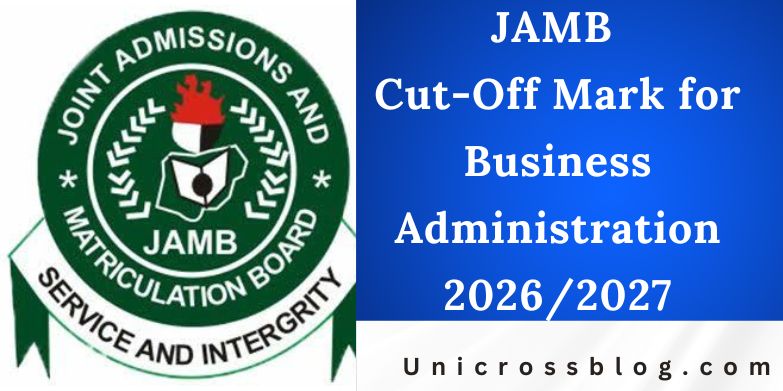The Joint Admissions and Matriculation Board (JAMB) plays a crucial role in the Nigerian education system by regulating university admissions through the Unified Tertiary Matriculation Examination (UTME). For aspiring students interested in Business Administration, understanding the JAMB cut-off mark is essential for planning and preparation. Business Administration is a highly sought-after course that equips students with skills in management, finance, marketing, and entrepreneurship, preparing them for dynamic careers in the corporate world.
As of now, the official cut-off marks for the 2026/2027 academic session have not yet been announced by JAMB. These marks are typically released during the annual policy meeting in July or August of the preceding year, following stakeholder consultations. Based on trends from the 2025/2026 session, where JAMB set the minimum admissible score at 150 for universities, 100 for polytechnics, and 100 for colleges of education, it is reasonable to anticipate similar or slightly adjusted benchmarks for 2026/2027. Individual institutions, however, retain the autonomy to raise their thresholds to manage competition and ensure quality intake.
This guide provides a comprehensive overview of expected cut-off marks for Business Administration, drawing from recent data and institutional patterns. It covers the general requirements, subject combinations, and a detailed table of projected cut-offs across various Nigerian universities. By aiming for scores above the minimum, candidates can enhance their chances in the post-UTME screening and secure admission into reputable programs. Whether you are a fresh UTME candidate or considering a change of course, this information will help you navigate the process effectively.

What is the JAMB Cut-Off Mark?
The JAMB cut-off mark represents the lowest score a candidate must achieve in the UTME to qualify for consideration in the admission process for a specific course and institution. It is not a fixed guarantee of admission but serves as an eligibility threshold. JAMB establishes a national minimum, while universities, polytechnics, and colleges set their own departmental cut-offs, often higher for competitive courses like Business Administration.
For the 2025/2026 session, JAMB fixed the university benchmark at 150, reflecting a slight increase from previous years to address overcrowding and maintain standards. Polytechnics and colleges of education were set at 100 each. Business Administration, being a non-professional course, generally aligns with these general cut-offs but can vary significantly by institution. Top federal universities may demand 200 or more, while state and private ones might accept 160 to 180.
Cut-off marks are influenced by factors such as the number of applicants, available slots, candidate performance in the UTME, and post-UTME results. They are announced post-UTME and can change annually. Candidates scoring below the institutional cut-off are ineligible for screening, emphasizing the need for thorough preparation. Additionally, O’Level requirements, including five credits in relevant subjects, must be met alongside the UTME score.
JAMB Subject Combination for Business Administration
To sit for the UTME and qualify for Business Administration, candidates must select the appropriate subject combination. JAMB mandates English Language as a compulsory subject, with three others from a specified list. The recommended combination is:
- English Language (compulsory)
- Mathematics
- Economics
- Any one of Government, Commerce, or Principles of Accounts
This combination tests foundational skills in quantitative analysis, economic principles, and administrative knowledge, which are core to the Business Administration curriculum. Scoring at least 40% in each subject is advisable to boost the aggregate score. During registration, ensure your choices align with the university’s guidelines to avoid disqualification.
For Direct Entry candidates, requirements include a National Diploma (ND) or National Certificate of Education (NCE) in a related field with a minimum Upper Credit, plus the O’Level credits.
O’Level Requirements
Admission into Business Administration also hinges on Senior Secondary Certificate Examination (SSCE) results from WAEC, NECO, or NABTEB. Candidates need at least five credit passes in not more than two sittings, including:
- English Language
- Mathematics
- Economics
- Two other relevant subjects such as Commerce, Government, Accounting, or Business Methods
These credits validate a candidate’s basic proficiency and are verified during screening. Combined results from different exam bodies are acceptable in most institutions, but always confirm with your chosen university. Failure to meet this criterion can lead to rejection, even with a high UTME score.
Cut-Off Marks by Institution
Cut-off marks for Business Administration differ across federal, state, and private universities, reflecting their prestige and applicant volume. The table below outlines projected cut-off marks for the 2026/2027 session, based on 2025/2026 data and historical trends. These are estimates; official figures will be confirmed by each institution post-UTME.
| Institution Type | University Name | Projected Cut-Off Mark for Business Administration |
|---|---|---|
| Federal | University of Lagos (UNILAG) | 250 |
| Federal | University of Ibadan (UI) | 240 |
| Federal | Obafemi Awolowo University (OAU) | 230 |
| Federal | Ahmadu Bello University (ABU) | 200 |
| Federal | University of Nigeria, Nsukka (UNN) | 210 |
| Federal | University of Benin (UNIBEN) | 200 |
| State | Lagos State University (LASU) | 180 |
| State | Delta State University (DELSU) | 170 |
| State | Ekiti State University (EKSU) | 160 |
| State | Ambrose Alli University (AAU) | 170 |
| Private | Covenant University | 220 |
| Private | Babcock University | 200 |
| Private | American University of Nigeria (AUN) | 210 |
| Polytechnic | Yaba College of Technology (YABATECH) | 100 (ND) |
| Polytechnic | Federal Polytechnic, Ilaro | 100 (ND) |
Note: These projections assume stability from the previous session, where federal universities averaged 200+, states 160-180, and privates 200-220. Polytechnics offer National Diplomas (ND) at the lower threshold of 100.
Admission Process and Tips
The admission journey begins with UTME registration, followed by the exam. Post-results, eligible candidates apply for post-UTME screening, which may include aptitude tests, interviews, or weighted aggregates (e.g., 50% UTME + 30% post-UTME + 20% O’Level).
To maximize chances:
- Target a UTME score 20-50 points above the projected cut-off.
- Practice past questions and time management.
- Choose institutions wisely, using the JAMB brochure.
- Monitor the Central Admissions Processing System (CAPS) for offers.
- Consider supplementary admissions if initial choices fail.
For 2026/2027, early preparation is key, as registration typically opens in January.
Career Opportunities in Business Administration
A degree in Business Administration opens doors to diverse roles in Nigeria’s growing economy. Graduates can pursue careers in banking, consulting, marketing, human resources, or entrepreneurship. Entry-level positions like business analysts or administrative officers often start at competitive salaries, with advancement to managerial roles. The course’s versatility also supports further studies in MBA programs or certifications like Chartered Institute of Management Accountants (CIMA). With Nigeria’s entrepreneurial boom, many alumni launch startups, contributing to sectors like fintech and agribusiness.
READ ALSO: JAMB Cut-Off Mark for Computer Engineering 2026/2027
FAQs
What is the minimum JAMB score for Business Administration in 2026/2027?
The national minimum for universities is expected to remain 150, but most institutions require 160-250 depending on competitiveness.
Can I study Business Administration with a score below 200?
Yes, in less competitive state or private universities, but aim higher for federal ones to stand out.
Is Mathematics compulsory in O’Level for this course?
Yes, along with English and Economics, plus two other relevant subjects.
What if I don’t meet the cut-off after post-UTME?
Explore change of institution/course via JAMB or apply for supplementary admission lists.
How does post-UTME affect the final cut-off?
It contributes to the aggregate score; strong performance can offset a borderline UTME result.
Are there scholarships for Business Administration students?
Yes, options like PTDF or state government scholarships are available for high achievers.







